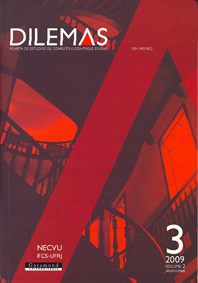A difícil adaptação da polícia paulista ao estado de direito (pós-1946 e pós-1985)
Keywords:
polícia, cultura policial, democracia, arbitrariedade, projetos de reformaAbstract
No Brasil, a discussão sobre políticas de segurança pública em períodos democráticos teve como núcleo compatibilizar o sistema policial com demandas e exigências do estado de direito, tanto após a queda da ditadura Vargas, em 1946, como após o regime militar, em 1985. Este artigo reflete sobre obstáculos que inviabilizaram reformas no setor, utilizando-se do conceito de cultura policial na compreensão dos valores e das práticas institucionais conformadoras da identidade profissional que levam à resistência a mudanças.
The debate on public security policies in Brazil during periods of democracy has been focused on making of the police system compatible with the requirements of the “state of rights”, both after the fall of the Getulio Vargas dictatorship in 1946
and in the post-military regime era, since 1985. The article The challenges for Sao Paulo police to comply with ‘Rechtsstaat' discusses obstacles to reform the sector, using the idea of “police culture” to explain the elements that inform professional identity and lead to resistance to changes.
Downloads
Published
Issue
Section
License
Upon submitting a text, the authors retain copyright and grant DILEMAS - Revista de Estudos de Conflito e Controle Social the right of first publication, with the work simultaneously licensed under the Creative Commons License type attribution BY (CC-BY), which permits sharing of the work with acknowledgment of authorship and initial publication in this journal.

